Factors affecting second language learning
Download as ppt, pdf41 likes52,386 views
The document discusses several factors that can affect success in second language acquisition, including motivation, aptitude, personality, intelligence, and learner preferences. It describes research that attempted to correlate these learner characteristics with L2 proficiency by administering questionnaires and proficiency tests. However, precisely measuring qualities like personality is difficult. Motivation in particular has been extensively studied but the relationship between motivation and success is complex, with the possibility that both influence each other. The document also discusses individual differences in learning styles and beliefs that teachers can take into account.
1 of 23
Downloaded 1,249 times
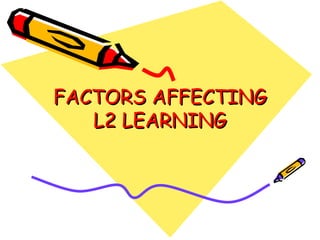

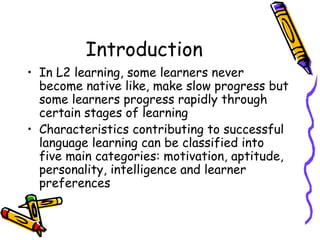
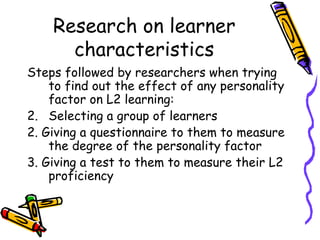
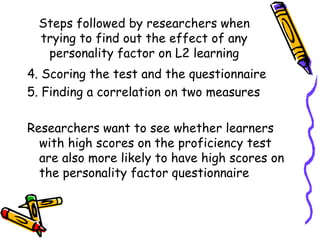
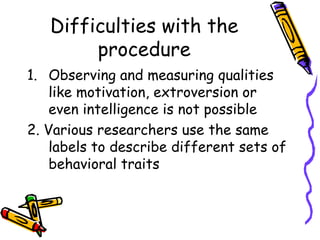
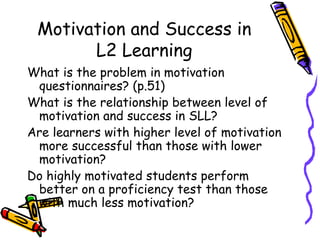

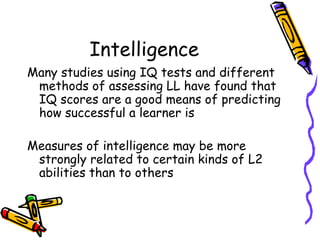
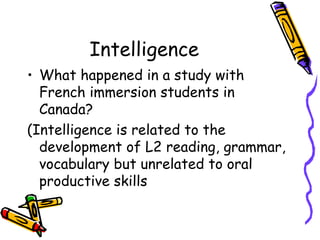

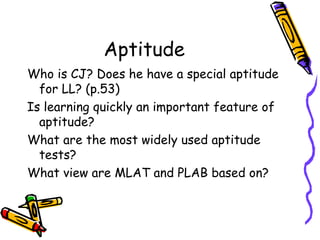
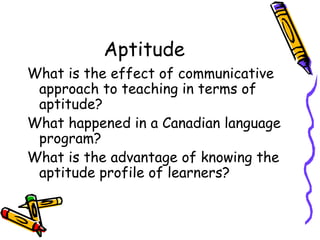
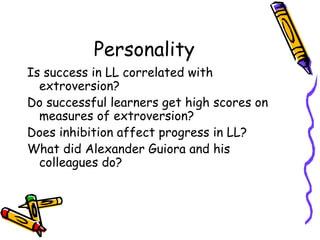
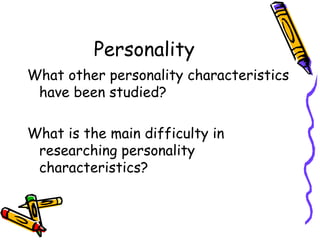
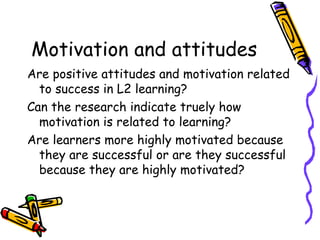
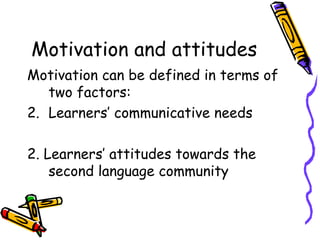
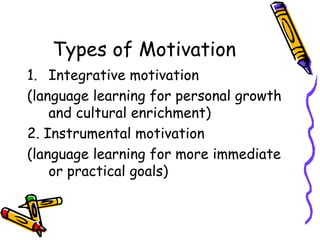

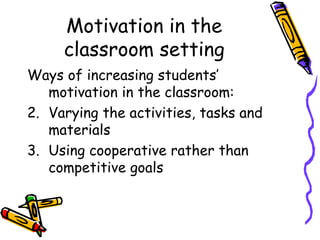
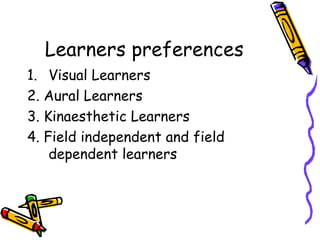
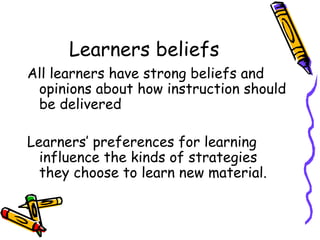
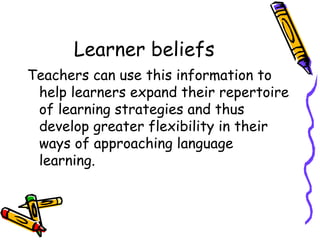
Ad
Recommended
Age and language acquisition
Age and language acquisitionFariba Chamani
Ěý
1. Younger learners may learn a second language better in naturalistic contexts due to factors like implicit learning abilities, while older learners tend to perform better in formal instruction due to explicit learning skills.
2. The critical period hypothesis proposes that there is an ideal window for acquiring language naturally, but age effects on second language acquisition involve complex interactions between learner characteristics and the environment.
3. While older learners can still achieve high proficiency, younger learners may be more likely to develop native-like abilities in areas like pronunciation. Teaching methods should consider the different strengths of younger and older learners.COGNITIVE FACTORS OF SECOND LANGUAGE LEARNING
COGNITIVE FACTORS OF SECOND LANGUAGE LEARNINGINSTITUTE OF ENGLISH LANGUAGE AND LITERATURE
Ěý
The document discusses cognitive factors that influence success in second language learning. It identifies three key cognitive factors: intelligence, language aptitude, and language learning strategies. Intelligence refers to mental abilities measured by IQ tests, and may play a stronger role in rule-based language learning than communicative learning. Language aptitude comprises an individual's ability to identify sounds, understand word functions, deduce rules, and memorize words - it is one of the strongest indicators of success. Effective language learners employ helpful strategies like planning, monitoring, and rehearsal. Teachers can support students' development by understanding these cognitive factors and tailoring their instruction accordingly.Individual learner differences and l2 acquisition
Individual learner differences and l2 acquisitionozzyl_bintang
Ěý
1. Individual differences like age, intelligence, aptitude, motivation, and learning strategies affect how successful learners are in acquiring a second language even if they experience the same instruction.
2. Key factors that influence success include language aptitude (e.g. phonemic coding ability, inductive language learning ability), motivation types (integrative, instrumental, intrinsic), and cognitive learning strategies used.
3. Aptitude and motivation positively correlate with second language acquisition performance, while different learning strategies may suit different instructional methods.Individual differences in l2 acquisition
Individual differences in l2 acquisitionindriyatul munawaroh
Ěý
This document summarizes several factors that influence individual differences in second language acquisition: language aptitude, motivation, and learning strategies. It describes John Carroll's theory of language aptitude consisting of phonemic coding ability, grammatical sensitivity, inductive language learning ability, and rote learning ability. It defines instrumental, integrative, resultative, and intrinsic motivation. It categorizes learning strategies as cognitive, metacognitive, or social/affective and notes that good language learners are very active, aware of their learning process and style, and flexible in using appropriate strategies.Behaviourist learning theory (in SLA)
Behaviourist learning theory (in SLA) Iffat Jahan Suchona
Ěý
This document discusses behaviourist learning theory and its key concepts of habits and errors in language learning. It explains that behaviourism views language learning as habit formation through stimulus-response associations that are strengthened by reinforcement or punishment. Errors occur due to interference from habits already formed in the first language. The similarities and differences between the first and second languages influence whether habits transfer positively or negatively, facilitating or inhibiting second language acquisition. Behaviourism aimed to avoid errors by breaking down language into discrete habits that could be systematically practiced and mastered.An Intro to Applied Linguistics-PPT.pdf
An Intro to Applied Linguistics-PPT.pdfVATHVARY
Ěý
This document provides an overview of the subject area of Applied Linguistics. It discusses learning goals such as providing an outline of AL as an academic subject and examining career opportunities. AL aims to solve real-world language problems. Examples include how to teach languages better, diagnose speech issues, improve translator training, and more. The document discusses definitions of AL, the scope of AL including language teaching/learning and content areas like forensic linguistics. Applied linguists investigate established language problems through literature reviews and data analysis, and also identify new problems. A brief history of the development of AL in different countries is also mentioned.Applied linguistics revision of theories
Applied linguistics revision of theoriesYoussef Oustad
Ěý
The document discusses four major theories of second language acquisition:
1) The behaviorist perspective which focuses on habit formation through practice and reinforcement.
2) The innatist perspective which posits that humans have an innate Universal Grammar that facilitates language learning.
3) The cognitive/developmental perspective which explains language learning through general theories of learning like information processing and interaction.
4) The sociocultural perspective which views language development as arising through social interaction, such as interacting within one's Zone of Proximal Development.Cognitive theory
Cognitive theoryyaseen zebary
Ěý
The document discusses cognitive approaches to second language learning, contrasting them with behaviorism, emphasizing that language acquisition involves conscious processing and learning strategies. It outlines various schools of thought, key cognitive theorists, and specific models, such as information processing and processability theory, to explain how learners acquire language and restructure their knowledge. The document also explores learning strategies that enhance language acquisition, focusing on metacognitive, cognitive, and social/affective approaches.SLA ,Learning Theories , Second language Aquisition
SLA ,Learning Theories , Second language Aquisitionmoji azimi
Ěý
This document discusses theories of second language acquisition (SLA). It covers linguistic, psychological, and sociocultural theories including: Universal Grammar, Monitor Theory, Natural Order Hypothesis, Comprehension Input Hypothesis, Affective Filter Hypothesis, Behaviorism, Contrastive Analysis Hypothesis, Cognitive Psychology, Information Processing Theory, Connectionism, Processability Theory, Interactionist Perspectives, Sociocultural Perspectives, Interlanguage, Developmental Sequences, and the role of the first language and instruction in SLA. The document provides an overview of many influential theories that aim to explain how people learn a second language.6 individual learner differences in sla reseach
6 individual learner differences in sla reseachSilvia Nanda Putri Erito
Ěý
The document explores individual learner differences in second language acquisition (SLA), highlighting factors such as age, motivation, personality, and learning styles that impact language competency. It discusses various research methodologies and the importance of understanding learning strategies, while also examining a study that analyzes the role of learning styles among university students. The findings suggest that incorporating diverse learning styles into SLA programs can enhance language learning outcomes.Individual differences in second language learning
Individual differences in second language learningUTPL UTPL
Ěý
The document discusses individual differences that can impact second language learning, including intelligence, aptitude, and learning styles. It describes research showing intelligence is related to certain language skills but not oral abilities. Aptitude tests measure the ability to learn sounds, grammar, and vocabulary. Learning styles, like field independence/dependence and Kolb's styles, influence how learners prefer to intake information. Educators hope understanding these differences can help all learners succeed.Second Language Acquisition Theories
Second Language Acquisition TheoriesAbir Aboutaha
Ěý
This document discusses several theories of second language acquisition, including behaviorism, innatism, and Krashen's Monitor Model. It provides details on behaviorist theory proposed by Skinner, innatist theory by Chomsky, and five hypotheses in Krashen's Monitor Model: acquisition vs learning, the Monitor, natural order, input, and affective filter. The theories differ in their views of the language learning process and what factors influence it.Bilingualism
Bilingualism Mah Noor
Ěý
Bilingualism refers to using two languages fluently like a native speaker. There are different types of bilingualism including additive bilingualism which occurs when a second language is learned in addition to the first, and subtractive bilingualism where the first language is replaced by the second. Early bilingualism can be simultaneous, where two languages are learned from birth, or successive where a second language is learned after partially acquiring the first language in early childhood. Late bilingualism refers to learning a second language after age 6 or 7, especially in adolescence or adulthood. Passive bilingualism means understanding a second language without speaking it. Learning a second language provides cognitive benefits for children and promotes empathy, cultural understanding,Learning Language Theories
Learning Language Theories Self-employed
Ěý
The document outlines key theories related to language learning, including behaviorist, cognitive, constructivism, and Chomsky’s universal grammar. It highlights the principles of each theory and their implications in educational practices, emphasizing the lack of a comprehensive theory of second language acquisition. The text also encourages reflection on personal teaching methodologies and preferences in relation to these language learning theories.Second language acquisition
Second language acquisition-
Ěý
This document discusses key concepts in second language acquisition, including the distinction between learning and acquisition, affective factors that can impact adult L2 learning, methods and approaches to teaching languages, and components of communicative competence. It addresses differences between acquiring an L1 and learning an L2, barriers to L2 acquisition for adults, and theories like the critical period hypothesis. Input/output processing and the role of practice producing the L2 are covered. The concept of an interlanguage is introduced, as well as positive/negative transfer from the L1.Applied linguistics presentation
Applied linguistics presentationMuhammad Furqan
Ěý
The document discusses applied linguistics and interdisciplines. It defines applied linguistics as using linguistic theories and methods to solve language problems in other fields. The history of applied linguistics is discussed, along with its aims to study language learning and teaching and solve related problems. Interdisciplines that applied linguistics interacts with are sociolinguistics, psycholinguistics, neurolinguistics, and various applied areas like education, speech therapy, computing, and international relations.Contrastive analysis
Contrastive analysisdamarisescobar1911
Ěý
Contrastive analysis is the systematic study of two languages to identify their structural differences and similarities. It was originally used to establish language families but was later applied to second language acquisition in the 1960s. The contrastive analysis hypothesis claimed that elements similar between a learner's first and second language would be easier to acquire, while differences would be more difficult. However, empirical evidence showed this could not predict all errors, and some uniform errors occurred regardless of first language. This led to the development of error analysis and the concept of interlanguage, seeing second language acquisition as its own rule-governed linguistic system rather than an imperfect version of the target language.Universal grammar
Universal grammarGuillermo Cid
Ěý
This document discusses Universal Grammar (UG) and its role in second language acquisition. UG proposes that the human brain is hardwired with innate, universal principles of grammar. It suggests that children learn the rules of their native language quickly because their brain contains a Language Acquisition Device that allows them to map the principles of UG onto the parameters of the specific language. The document outlines the history and key concepts of UG, including poverty of stimulus, constraints on learning, and universal developmental patterns. It also discusses related concepts like principles and parameters, and Chomsky's Minimalist Program. Researchers have studied whether and how second language learners may access the principles of UG.Introduction to psycholinguistics
Introduction to psycholinguisticsLusya Liann
Ěý
This document discusses psycholinguistics and language acquisition. It addresses the general issues of psycholinguistics including language acquisition, production, comprehension, and the relationship between language and thought. It then focuses on first and second language acquisition. It describes two notions in first language acquisition: overgeneralization and undergeneralization. Some examples of each are provided. Reasons for overgeneralization and undergeneralization are discussed. Stages of first language acquisition are outlined. The document concludes by discussing whether children are better than adults at learning a second language and comparing natural and classroom settings for second language learning.Communicative Language Teaching
Communicative Language TeachingGemma Costa
Ěý
The document discusses Communicative Language Teaching (CLT), an approach to teaching second languages that emphasizes using the language interactively to communicate and perform meaningful tasks. CLT focuses on interaction as both the means and goal of learning, considers communicative dimensions beyond just grammar structures, provides motivation for learners, and centers around their interests and needs. Some key benefits of this approach include its holistic view of language, ability to motivate learners, and relevance in a world where communication technologies are increasingly important.Contrastive analysis
Contrastive analysis khaliliavatalk
Ěý
The document discusses contrastive analysis and error analysis in language learning. It covers:
1) The weak, moderate, and strong versions of contrastive analysis hypothesis (CAH) and their limitations in predicting learner errors.
2) Factors like language transfer, both positive and negative, that can facilitate or hinder second language acquisition.
3) Problems with CAH predictions and the finding that many errors are not due to language differences.
4) Procedures for comparing languages in a contrastive analysis, including selecting areas, describing languages, comparing features, predicting difficulties, and verifying predictions.
5) Hierarchies of difficulty proposed to formalize predictions, including six categories ranging fromLanguage and linguistics error analysis
Language and linguistics error analysisMuhammadiyah University of Surakarta
Ěý
The document summarizes key aspects of error analysis as applied to the study of second language acquisition. It discusses error analysis as the first approach to SLA, focusing on learners' creative abilities and systematic errors. It then describes the main stages of conducting an error analysis - recognition, description and explanation of errors. Various error classification frameworks are also summarized, including analyzing errors based on linguistic category, surface strategy, comparisons to first language acquisition, and communicative effect.Factors affecting language learning
Factors affecting language learningKaren R. Suárez
Ěý
The document discusses several factors that affect language learning, including learner characteristics, age, gender, aptitude, motivation, personality, cognitive/learning styles, hemisphere specialization, and learning strategies. It notes that understanding these learner characteristics allows teachers to help students develop positive traits and tailor their teaching approaches to better support different students. Age in particular plays a major role in decisions around how and what to teach, as children, adolescents, and adults learn differently and benefit from different teaching techniques due to variations in maturity levels.Code Switching and Code Mixing
Code Switching and Code MixingBlanca Sosa
Ěý
This document defines and distinguishes between code switching and code mixing in bilingual communication. It explains that code switching involves changing languages unpredictably to fit the environment, and can occur between sentences or within a sentence. In contrast, code mixing involves borrowing words from one language into another without a change in topic, often within a single sentence. The document provides examples and discusses reasons for using code switching or code mixing, including lack of a word in one language, emphasis, or expressing group identity.Direct method by m.hasnnain
Direct method by m.hasnnainMuhammad Haseeb
Ěý
The Direct Method is an approach to teaching foreign languages that uses the target language exclusively and avoids translation or explaining grammar rules. It was developed in the 1860s based on observations of how children acquire their first language. Key principles include using real-world examples and demonstrations rather than explanations, emphasizing oral skills and questions/answers, and avoiding grammar explanations. Techniques include reading aloud, conversations, dictation, and map tasks. While it aims to mimic natural language acquisition, critics argue it is difficult to implement fully and may not be suitable for large classes.3 Factors Affecting L2 Learning
3 Factors Affecting L2 LearningDr. Cupid Lucid
Ěý
The document discusses several factors that can affect second language learning, including intelligence, aptitude, personality, motivation, learner preferences/styles, and age of acquisition. Regarding intelligence, different types exist (e.g. linguistic, logical) and it may correlate more with rule-based learning than communicative skills. Aptitude predicts future achievement and includes abilities like sound identification and grammar rule inference. Personality's role is unclear but extroversion and risk-taking may help, while inhibition hinders pronunciation. Motivation can be intrinsic or extrinsic/instrumental, and identity/attitudes also influence learning. Learner styles include visual/auditory preferences and field independence/dependence in processing information.Factors affecting second language acquisition
Factors affecting second language acquisitionHasan BÄ°LOKCUOGLU
Ěý
This document summarizes several key factors that affect second language acquisition. It discusses individual factors like age, personality, motivation, experiences, cognition, and native language. External factors discussed include curriculum, instruction, culture and status, motivation, and access to native speakers. Affective factors that can influence language learning are self-esteem, inhibition, risk-taking, anxiety, and empathy. Younger children tend to acquire a second language more easily than older learners due to biological factors, but older children and adults learn more rapidly initially. Personality, motivation, experiences, and cognitive abilities also impact success in acquiring a new language.Summary of ELT Methods & Approaches
Summary of ELT Methods & Approaches Sherif Akl
Ěý
The document discusses various language teaching methods, including Grammar Translation, Direct Method, Audio-Lingual Method, Silent Way, Suggestopedia, Total Physical Response, Communicative Language Teaching, Natural Approach, Community Language Learning, Dogme ELT, and Post-method teaching. Each method has its own principles, strengths, and criticisms, emphasizing different aspects of language acquisition, from grammar and translation to the importance of interaction and real-life communication. The overview reflects the evolution of language teaching methodologies over time and their varying focuses on learner engagement, pronunciation, and the use of the mother tongue.Lecture 6 Focus on Learning and the Language learner.pptx
Lecture 6 Focus on Learning and the Language learner.pptxaraiakzhigitovaaa
Ěý
This document discusses factors that affect second language acquisition, including affective variables like motivation and attitudes, personality variables like introversion/extroversion and tolerance of ambiguity, and cognitive variables like learning styles and intelligence.
It describes different types of motivation, such as intrinsic vs extrinsic and integrative vs instrumental, and how motivation strongly influences long-term language retention. It also discusses how attitudes towards the target language culture and one's own culture can impact language learning.
Personality traits such as introversion/extroversion, tolerance of ambiguity, and willingness to take risks are also examined. Additionally, the document outlines various cognitive factors including learning styles, multiple intelligences, and learning strategies that students can use to enhance learner variables in language learning
learner variables in language learningkabrera100
Ěý
There are several learner variables that can influence success in second language acquisition according to research:
1. Intelligence - While general intelligence helps with rule-based learning, other types of intelligence like musical and interpersonal intelligence may also support language learning.
2. Aptitude - Aptitude, including abilities in sound discrimination, rule inference, and memory, predicts success with grammar-focused instruction but may be less important for communicative language teaching.
3. Personality - Some studies link traits like extroversion to success, but relationships are unclear. Personality may only affect oral skills, not literacy.More Related Content
What's hot (20)
SLA ,Learning Theories , Second language Aquisition
SLA ,Learning Theories , Second language Aquisitionmoji azimi
Ěý
This document discusses theories of second language acquisition (SLA). It covers linguistic, psychological, and sociocultural theories including: Universal Grammar, Monitor Theory, Natural Order Hypothesis, Comprehension Input Hypothesis, Affective Filter Hypothesis, Behaviorism, Contrastive Analysis Hypothesis, Cognitive Psychology, Information Processing Theory, Connectionism, Processability Theory, Interactionist Perspectives, Sociocultural Perspectives, Interlanguage, Developmental Sequences, and the role of the first language and instruction in SLA. The document provides an overview of many influential theories that aim to explain how people learn a second language.6 individual learner differences in sla reseach
6 individual learner differences in sla reseachSilvia Nanda Putri Erito
Ěý
The document explores individual learner differences in second language acquisition (SLA), highlighting factors such as age, motivation, personality, and learning styles that impact language competency. It discusses various research methodologies and the importance of understanding learning strategies, while also examining a study that analyzes the role of learning styles among university students. The findings suggest that incorporating diverse learning styles into SLA programs can enhance language learning outcomes.Individual differences in second language learning
Individual differences in second language learningUTPL UTPL
Ěý
The document discusses individual differences that can impact second language learning, including intelligence, aptitude, and learning styles. It describes research showing intelligence is related to certain language skills but not oral abilities. Aptitude tests measure the ability to learn sounds, grammar, and vocabulary. Learning styles, like field independence/dependence and Kolb's styles, influence how learners prefer to intake information. Educators hope understanding these differences can help all learners succeed.Second Language Acquisition Theories
Second Language Acquisition TheoriesAbir Aboutaha
Ěý
This document discusses several theories of second language acquisition, including behaviorism, innatism, and Krashen's Monitor Model. It provides details on behaviorist theory proposed by Skinner, innatist theory by Chomsky, and five hypotheses in Krashen's Monitor Model: acquisition vs learning, the Monitor, natural order, input, and affective filter. The theories differ in their views of the language learning process and what factors influence it.Bilingualism
Bilingualism Mah Noor
Ěý
Bilingualism refers to using two languages fluently like a native speaker. There are different types of bilingualism including additive bilingualism which occurs when a second language is learned in addition to the first, and subtractive bilingualism where the first language is replaced by the second. Early bilingualism can be simultaneous, where two languages are learned from birth, or successive where a second language is learned after partially acquiring the first language in early childhood. Late bilingualism refers to learning a second language after age 6 or 7, especially in adolescence or adulthood. Passive bilingualism means understanding a second language without speaking it. Learning a second language provides cognitive benefits for children and promotes empathy, cultural understanding,Learning Language Theories
Learning Language Theories Self-employed
Ěý
The document outlines key theories related to language learning, including behaviorist, cognitive, constructivism, and Chomsky’s universal grammar. It highlights the principles of each theory and their implications in educational practices, emphasizing the lack of a comprehensive theory of second language acquisition. The text also encourages reflection on personal teaching methodologies and preferences in relation to these language learning theories.Second language acquisition
Second language acquisition-
Ěý
This document discusses key concepts in second language acquisition, including the distinction between learning and acquisition, affective factors that can impact adult L2 learning, methods and approaches to teaching languages, and components of communicative competence. It addresses differences between acquiring an L1 and learning an L2, barriers to L2 acquisition for adults, and theories like the critical period hypothesis. Input/output processing and the role of practice producing the L2 are covered. The concept of an interlanguage is introduced, as well as positive/negative transfer from the L1.Applied linguistics presentation
Applied linguistics presentationMuhammad Furqan
Ěý
The document discusses applied linguistics and interdisciplines. It defines applied linguistics as using linguistic theories and methods to solve language problems in other fields. The history of applied linguistics is discussed, along with its aims to study language learning and teaching and solve related problems. Interdisciplines that applied linguistics interacts with are sociolinguistics, psycholinguistics, neurolinguistics, and various applied areas like education, speech therapy, computing, and international relations.Contrastive analysis
Contrastive analysisdamarisescobar1911
Ěý
Contrastive analysis is the systematic study of two languages to identify their structural differences and similarities. It was originally used to establish language families but was later applied to second language acquisition in the 1960s. The contrastive analysis hypothesis claimed that elements similar between a learner's first and second language would be easier to acquire, while differences would be more difficult. However, empirical evidence showed this could not predict all errors, and some uniform errors occurred regardless of first language. This led to the development of error analysis and the concept of interlanguage, seeing second language acquisition as its own rule-governed linguistic system rather than an imperfect version of the target language.Universal grammar
Universal grammarGuillermo Cid
Ěý
This document discusses Universal Grammar (UG) and its role in second language acquisition. UG proposes that the human brain is hardwired with innate, universal principles of grammar. It suggests that children learn the rules of their native language quickly because their brain contains a Language Acquisition Device that allows them to map the principles of UG onto the parameters of the specific language. The document outlines the history and key concepts of UG, including poverty of stimulus, constraints on learning, and universal developmental patterns. It also discusses related concepts like principles and parameters, and Chomsky's Minimalist Program. Researchers have studied whether and how second language learners may access the principles of UG.Introduction to psycholinguistics
Introduction to psycholinguisticsLusya Liann
Ěý
This document discusses psycholinguistics and language acquisition. It addresses the general issues of psycholinguistics including language acquisition, production, comprehension, and the relationship between language and thought. It then focuses on first and second language acquisition. It describes two notions in first language acquisition: overgeneralization and undergeneralization. Some examples of each are provided. Reasons for overgeneralization and undergeneralization are discussed. Stages of first language acquisition are outlined. The document concludes by discussing whether children are better than adults at learning a second language and comparing natural and classroom settings for second language learning.Communicative Language Teaching
Communicative Language TeachingGemma Costa
Ěý
The document discusses Communicative Language Teaching (CLT), an approach to teaching second languages that emphasizes using the language interactively to communicate and perform meaningful tasks. CLT focuses on interaction as both the means and goal of learning, considers communicative dimensions beyond just grammar structures, provides motivation for learners, and centers around their interests and needs. Some key benefits of this approach include its holistic view of language, ability to motivate learners, and relevance in a world where communication technologies are increasingly important.Contrastive analysis
Contrastive analysis khaliliavatalk
Ěý
The document discusses contrastive analysis and error analysis in language learning. It covers:
1) The weak, moderate, and strong versions of contrastive analysis hypothesis (CAH) and their limitations in predicting learner errors.
2) Factors like language transfer, both positive and negative, that can facilitate or hinder second language acquisition.
3) Problems with CAH predictions and the finding that many errors are not due to language differences.
4) Procedures for comparing languages in a contrastive analysis, including selecting areas, describing languages, comparing features, predicting difficulties, and verifying predictions.
5) Hierarchies of difficulty proposed to formalize predictions, including six categories ranging fromLanguage and linguistics error analysis
Language and linguistics error analysisMuhammadiyah University of Surakarta
Ěý
The document summarizes key aspects of error analysis as applied to the study of second language acquisition. It discusses error analysis as the first approach to SLA, focusing on learners' creative abilities and systematic errors. It then describes the main stages of conducting an error analysis - recognition, description and explanation of errors. Various error classification frameworks are also summarized, including analyzing errors based on linguistic category, surface strategy, comparisons to first language acquisition, and communicative effect.Factors affecting language learning
Factors affecting language learningKaren R. Suárez
Ěý
The document discusses several factors that affect language learning, including learner characteristics, age, gender, aptitude, motivation, personality, cognitive/learning styles, hemisphere specialization, and learning strategies. It notes that understanding these learner characteristics allows teachers to help students develop positive traits and tailor their teaching approaches to better support different students. Age in particular plays a major role in decisions around how and what to teach, as children, adolescents, and adults learn differently and benefit from different teaching techniques due to variations in maturity levels.Code Switching and Code Mixing
Code Switching and Code MixingBlanca Sosa
Ěý
This document defines and distinguishes between code switching and code mixing in bilingual communication. It explains that code switching involves changing languages unpredictably to fit the environment, and can occur between sentences or within a sentence. In contrast, code mixing involves borrowing words from one language into another without a change in topic, often within a single sentence. The document provides examples and discusses reasons for using code switching or code mixing, including lack of a word in one language, emphasis, or expressing group identity.Direct method by m.hasnnain
Direct method by m.hasnnainMuhammad Haseeb
Ěý
The Direct Method is an approach to teaching foreign languages that uses the target language exclusively and avoids translation or explaining grammar rules. It was developed in the 1860s based on observations of how children acquire their first language. Key principles include using real-world examples and demonstrations rather than explanations, emphasizing oral skills and questions/answers, and avoiding grammar explanations. Techniques include reading aloud, conversations, dictation, and map tasks. While it aims to mimic natural language acquisition, critics argue it is difficult to implement fully and may not be suitable for large classes.3 Factors Affecting L2 Learning
3 Factors Affecting L2 LearningDr. Cupid Lucid
Ěý
The document discusses several factors that can affect second language learning, including intelligence, aptitude, personality, motivation, learner preferences/styles, and age of acquisition. Regarding intelligence, different types exist (e.g. linguistic, logical) and it may correlate more with rule-based learning than communicative skills. Aptitude predicts future achievement and includes abilities like sound identification and grammar rule inference. Personality's role is unclear but extroversion and risk-taking may help, while inhibition hinders pronunciation. Motivation can be intrinsic or extrinsic/instrumental, and identity/attitudes also influence learning. Learner styles include visual/auditory preferences and field independence/dependence in processing information.Factors affecting second language acquisition
Factors affecting second language acquisitionHasan BÄ°LOKCUOGLU
Ěý
This document summarizes several key factors that affect second language acquisition. It discusses individual factors like age, personality, motivation, experiences, cognition, and native language. External factors discussed include curriculum, instruction, culture and status, motivation, and access to native speakers. Affective factors that can influence language learning are self-esteem, inhibition, risk-taking, anxiety, and empathy. Younger children tend to acquire a second language more easily than older learners due to biological factors, but older children and adults learn more rapidly initially. Personality, motivation, experiences, and cognitive abilities also impact success in acquiring a new language.Summary of ELT Methods & Approaches
Summary of ELT Methods & Approaches Sherif Akl
Ěý
The document discusses various language teaching methods, including Grammar Translation, Direct Method, Audio-Lingual Method, Silent Way, Suggestopedia, Total Physical Response, Communicative Language Teaching, Natural Approach, Community Language Learning, Dogme ELT, and Post-method teaching. Each method has its own principles, strengths, and criticisms, emphasizing different aspects of language acquisition, from grammar and translation to the importance of interaction and real-life communication. The overview reflects the evolution of language teaching methodologies over time and their varying focuses on learner engagement, pronunciation, and the use of the mother tongue.Similar to Factors affecting second language learning (20)
Lecture 6 Focus on Learning and the Language learner.pptx
Lecture 6 Focus on Learning and the Language learner.pptxaraiakzhigitovaaa
Ěý
This document discusses factors that affect second language acquisition, including affective variables like motivation and attitudes, personality variables like introversion/extroversion and tolerance of ambiguity, and cognitive variables like learning styles and intelligence.
It describes different types of motivation, such as intrinsic vs extrinsic and integrative vs instrumental, and how motivation strongly influences long-term language retention. It also discusses how attitudes towards the target language culture and one's own culture can impact language learning.
Personality traits such as introversion/extroversion, tolerance of ambiguity, and willingness to take risks are also examined. Additionally, the document outlines various cognitive factors including learning styles, multiple intelligences, and learning strategies that students can use to enhance learner variables in language learning
learner variables in language learningkabrera100
Ěý
There are several learner variables that can influence success in second language acquisition according to research:
1. Intelligence - While general intelligence helps with rule-based learning, other types of intelligence like musical and interpersonal intelligence may also support language learning.
2. Aptitude - Aptitude, including abilities in sound discrimination, rule inference, and memory, predicts success with grammar-focused instruction but may be less important for communicative language teaching.
3. Personality - Some studies link traits like extroversion to success, but relationships are unclear. Personality may only affect oral skills, not literacy.Question 1.3
Question 1.3Sandra Guevara
Ěý
There are several factors that can influence differences in how successfully learners acquire a second language. Psychological factors within the individual include age, sex, aptitude, motivation, cognitive styles, personality, and learning strategies. Age does not necessarily determine success, as both children and adults can be successful learners. While research on sex differences is mixed, some studies have found women outperform men in certain language tasks. Aptitude, motivation, and learning strategies adopted by the individual also impact success. Cognitive styles and personality traits interact with social and learning contexts in complex ways to influence outcomes.Question 2.3
Question 2.3Sandra Guevara
Ěý
There are several factors that can influence differences in how successfully learners acquire a second language. Psychological factors within the individual include age, sex, aptitude, motivation, cognitive styles, personality, and learning strategies. Age does not necessarily determine success, as both children and adults can be successful learners. While research on sex differences is mixed, some studies have found women outperform men in certain language tasks. Aptitude, motivation, and learning strategies adopted by the individual also impact success. Cognitive styles and personality traits interact with social and learning contexts in complex ways to influence outcomes.Individual learner differences
Individual learner differencesarezoo aeli
Ěý
This document discusses several individual learner differences that can impact second language acquisition, including anxiety, age, language aptitude, intelligence, learning styles, motivation, personality traits, and cognitive styles. Anxiety is related to self-esteem and risk-taking and can interfere with learning. Adults generally progress faster than children in grammar acquisition but not always in pronunciation. Language aptitude, intelligence, and cognitive styles like field dependence/independence can also influence L2 learning.Llt slides (latest)
Llt slides (latest)Ameliya Lee
Ěý
This document discusses motivation, attitude, and aptitude in second language learning. It states that motivation, attitude, aptitude, personality, intelligence, and learner preferences contribute to successful language learning. Motivation can be intrinsic or extrinsic. Attitude is influenced by one's beliefs and socio-cultural setting, and positive attitude facilitates learning. Aptitude refers to an innate talent for language learning and impacts learning speed. Research shows motivation and attitude are strongly associated with L2 achievement, and motivated learners tend to perform better.Question 1.4
Question 1.4Sandra Guevara
Ěý
Differences among learners can influence their success in acquiring a second language. Psychological factors like age, sex, aptitude, motivation, cognitive styles, personality, and learning strategies all potentially play a role. Research has produced mixed findings on how some of these factors like age and sex impact language learning, and their effects depend on interactions with social and learning contexts. Aptitude, motivation, and learning strategies employed appear to be important predictors of success, though other variables also influence ultimate proficiency attainment in a second language.3 factors-affecting-l2-learning-1225479052924337-9
3 factors-affecting-l2-learning-1225479052924337-9Erol Kahraman
Ěý
This document discusses several factors that can affect second language learning, including intelligence, aptitude, personality, motivation, learner preferences, beliefs, and age of acquisition. It summarizes research on how each of these factors may influence language learning success. While some factors like intelligence and aptitude were previously thought to strongly predict success, more recent research suggests that motivation, personality, and teaching approaches tailored to learners' preferences and strengths may be more important influences. No single factor determines success, and learners can demonstrate strengths in different areas.Perspectives on First and Second Language Acquisition and Factors Influencing...
Perspectives on First and Second Language Acquisition and Factors Influencing...MichaelArgonillo2
Ěý
The document discusses factors affecting second language acquisition (L2) and contrasts it with first language acquisition (L1). Key influences on L2 learning include motivation, age, intelligence, personality, and external factors like curriculum and access to native speakers. The role of intrinsic and extrinsic motivation, as well as attitudes and learning styles, is emphasized as crucial in the language learning process.Factors that influence second language acquisition and learning
Factors that influence second language acquisition and learninglislieroyo1
Ěý
This document discusses several key factors that influence second language acquisition, including motivation, attitude, age, intelligence, aptitude, learning styles, and personality. Motivation is one of the most important factors, and can be either integrative, relating to interest in the language and its culture, or instrumental, relating to practical uses of the language. Other important influences include a learner's attitude towards the language and its community, their age and any critical periods for language learning, general and multiple types of intelligence, as well as their language learning aptitude, style, personality traits like inhibition, anxiety and empathy.Factors affecting SLA/L
Factors affecting SLA/LLuz Valeria LeĂłn
Ěý
There are many factors that can affect a learner's success in acquiring a second language. These include individual differences like intelligence, aptitude, age, and attitude. Affective factors such as anxiety, personality traits, motivation, and learner preferences also influence language learning. Motivation can be intrinsic or extrinsic, and integrative or instrumental. Learner preferences include learning styles which may be visual, auditory, tactile, kinesthetic, or haptic. Previous beliefs and strategies from prior learning experiences also impact second language acquisition.3_Factors_Affecting_L2_Learning.ppt
3_Factors_Affecting_L2_Learning.pptDrNajmonnisa
Ěý
This document discusses several individual difference factors that can influence second language acquisition, including intelligence, aptitude, learning styles, personality, motivation, and age of acquisition. It notes that while some studies have found links between certain traits and language learning success, such as extroversion and risk-taking, research results are often mixed or inconclusive due to challenges in defining and measuring the variables. Overall, no single personality trait or learning style has been shown to definitively determine SLA outcomes. A variety of factors may impact different aspects of the language learning process.Individual Differences
Individual Differencesabderrahmane ourahhou
Ěý
This document discusses several factors that can influence second language acquisition:
1. Age - Younger learners acquire language faster but older learners learn at a faster rate. Adults have a disadvantage with pronunciation but an advantage in learning rate.
2. Aptitude - An individual's natural ability to learn language, consisting of abilities like identifying sound patterns and inferring rules. Aptitude contributes to but does not determine proficiency.
3. Motivation - A key factor in SLA, it can be integrative, instrumental, intrinsic, or extrinsic. Instrumental motivation tends to lead to better performance according to some research. Attitudes and motivation are interrelated and can change over time with externalPresentation lls
Presentation llsuma7210
Ěý
This document discusses several factors that can affect language learning strategies use, including motivation, age, gender, personality, and learning strategies. It describes motivation as emanating from within the learner and involving goals, effort, and self-motivating strategies. Younger learners may acquire a second language more quickly initially or achieve higher proficiency long-term. Gender socialization and personality traits also interact with language learning. Effective language learners employ various learning strategies suited to their skills and needs.Five Factors That Affecting Learning Language Strategies
Five Factors That Affecting Learning Language StrategiesNik Siti Maisarah
Ěý
Five factors affect language learning strategies: intelligence, aptitude, personality, motivation/attitude, and learning styles. Intelligence, as measured by IQ scores, predicts success with analytic learning but may be less important for communicative focus. Aptitude includes abilities in sound identification, word functions/meanings, and grammar rules. Personality traits like anxiety, extroversion, and inhibition impact language learning. Motivation depends on communicative needs and language attitude. Learning styles are visual, auditory, or kinesthetic preferences for acquiring information. Teachers can motivate students and vary activities to engage different learning styles.3_Factors_Affecting_L2_Learning.ppt
3_Factors_Affecting_L2_Learning.pptFahadSaad20
Ěý
The research on individual differences in second language learning is complex due to the lack of clear definitions and measurements of variables and the interaction of multiple characteristics. While some characteristics like intelligence and age of acquisition may influence language learning, it is difficult to predict how a particular individual will succeed due to variability. Teachers should consider learners' individual traits but also understand that success depends on many interrelated factors.Factors affecting usage of language learning strategies
Factors affecting usage of language learning strategiesThe National University of Malaysia
Ěý
The document explores various factors influencing the usage of language learning strategies, including motivation, gender differences, experiences, learning styles, and personality traits. It highlights that motivation is crucial for language learning success and that gender may affect the frequency and type of strategies used. Additionally, personality traits such as extroversion, self-esteem, and anxiety significantly impact learners' strategies and their ability to engage in language acquisition.DIFFERENCES IN LEARNERS
DIFFERENCES IN LEARNERSbelenita78
Ěý
This document discusses factors that influence second language acquisition. It states that both younger and older learners can be successful, though younger learners may have an advantage due to brain plasticity while older learners' advantage lies in formal instruction settings. Motivation, cognitive style, personality traits, anxiety levels, and use of learning strategies all impact how successfully someone acquires a second language. The document also notes some believed gender differences and lists components commonly assessed in aptitude tests.Wk11 7805
Wk11 7805Dr. Cupid Lucid
Ěý
1. Many individual difference factors can influence second language acquisition, including motivation, personality, beliefs, age, aptitude, and learner strategies.
2. Age makes a difference in SLA, with younger learners generally acquiring a second language faster and to a higher level of proficiency, especially in terms of phonology. Children are also able to achieve native-like fluency while adults are more likely to retain an accent.
3. Motivation also plays an important role, with integrative motivation that involves identifying with the target language culture linked to more successful SLA outcomes than instrumental motivation focused on practical benefits alone.5 factors affecting LLS
5 factors affecting LLSMell_marl
Ěý
Five factors that affect language learning strategies are:
1) Gender - Females tend to use compensation, affective, and metacognitive strategies more than males.
2) Motivation and attitudes - Motivation comes from instrumental reasons like career goals or integrative reasons like wanting to immerse in the culture.
3) Learning style - Analytic learners prefer strategies like rule-learning while global learners use meaning-finding strategies.
4) Aptitude - Aptitude includes abilities like identifying sounds, understanding word functions, figuring out grammar rules, and memorizing words.
5) Personality - Traits like extroversion, inhibition, anxiety, and self-esteem canAd
Factors affecting second language learning
- 1. FACTORS AFFECTING L2 LEARNING
- 2. Introduction We use our own experience and research findings when evaluating success in the acquisition of L2 All normal children are successful in the acquisition of L1, given a normal upbringing. However, rate of development varies widely among L1 learners
- 3. Introduction In L2 learning, some learners never become native like, make slow progress but some learners progress rapidly through certain stages of learning Characteristics contributing to successful language learning can be classified into five main categories: motivation, aptitude, personality, intelligence and learner preferences
- 4. Research on learner characteristics Steps followed by researchers when trying to find out the effect of any personality factor on L2 learning: Selecting a group of learners 2. Giving a questionnaire to them to measure the degree of the personality factor 3. Giving a test to them to measure their L2 proficiency
- 5. Steps followed by researchers when trying to find out the effect of any personality factor on L2 learning 4. Scoring the test and the questionnaire 5. Finding a correlation on two measures Researchers want to see whether learners with high scores on the proficiency test are also more likely to have high scores on the personality factor questionnaire
- 6. Difficulties with the procedure Observing and measuring qualities like motivation, extroversion or even intelligence is not possible 2. Various researchers use the same labels to describe different sets of behavioral traits
- 7. Motivation and Success in L2 Learning What is the problem in motivation questionnaires? (p.51) What is the relationship between level of motivation and success in SLL? Are learners with higher level of motivation more successful than those with lower motivation? Do highly motivated students perform better on a proficiency test than those with much less motivation?
- 8. Motivation and Success in L2 Learning Do language proficiency tests used in different studies measure the same kind of knowledge? Do learners become successful because of their motivation? Does early success increase learners’ motivation? Are both success and motivation affected by special attitude for language learning or favorable learning context
- 9. Intelligence Many studies using IQ tests and different methods of assessing LL have found that IQ scores are a good means of predicting how successful a learner is Measures of intelligence may be more strongly related to certain kinds of L2 abilities than to others
- 10. Intelligence What happened in a study with French immersion students in Canada? (Intelligence is related to the development of L2 reading, grammar, vocabulary but unrelated to oral productive skills
- 11. Intelligence Intelligence may be a strong factor when it comes to learning in terms of linguistic analysis and grammatical rules. However, intelligence plays a minor role in classrooms with more focus on communication and interaction
- 12. Aptitude Who is CJ? Does he have a special aptitude for LL? (p.53) Is learning quickly an important feature of aptitude? What are the most widely used aptitude tests? What view are MLAT and PLAB based on?
- 13. Aptitude What is the effect of communicative approach to teaching in terms of aptitude? What happened in a Canadian language program? What is the advantage of knowing the aptitude profile of learners?
- 14. Personality Is success in LL correlated with extroversion? Do successful learners get high scores on measures of extroversion? Does inhibition affect progress in LL? What did Alexander Guiora and his colleagues do?
- 15. Personality What other personality characteristics have been studied? What is the main difficulty in researching personality characteristics?
- 16. Motivation and attitudes Are positive attitudes and motivation related to success in L2 learning? Can the research indicate truely how motivation is related to learning? Are learners more highly motivated because they are successful or are they successful because they are highly motivated?
- 17. Motivation and attitudes Motivation can be defined in terms of two factors: Learners’ communicative needs 2. Learners’ attitudes towards the second language community
- 18. Types of Motivation Integrative motivation (language learning for personal growth and cultural enrichment) 2. Instrumental motivation (language learning for more immediate or practical goals)
- 19. Motivation and attitudes Are integrative and instrumental motivation related to success in L2 learning? How can learning L2 be a source of enrichment or a source of resentment? Is motivation affected by the social dynamic or power relationship between the languages?
- 20. Motivation in the classroom setting Ways of increasing students’ motivation in the classroom: Varying the activities, tasks and materials Using cooperative rather than competitive goals
- 21. Learners preferences Visual Learners 2. Aural Learners 3. Kinaesthetic Learners 4. Field independent and field dependent learners
- 22. Learners beliefs All learners have strong beliefs and opinions about how instruction should be delivered Learners’ preferences for learning influence the kinds of strategies they choose to learn new material.
- 23. Learner beliefs Teachers can use this information to help learners expand their repertoire of learning strategies and thus develop greater flexibility in their ways of approaching language learning.